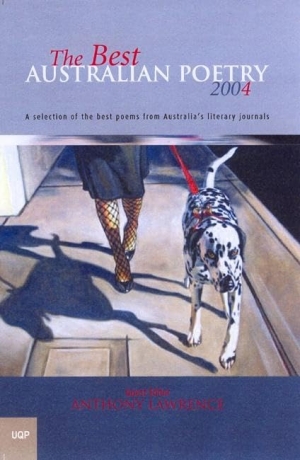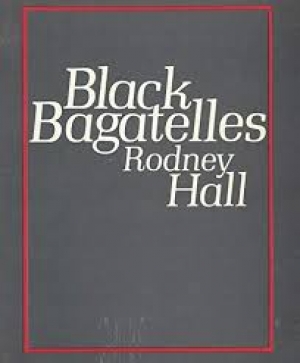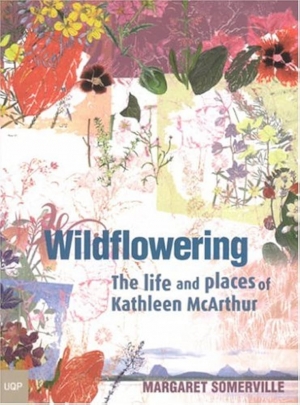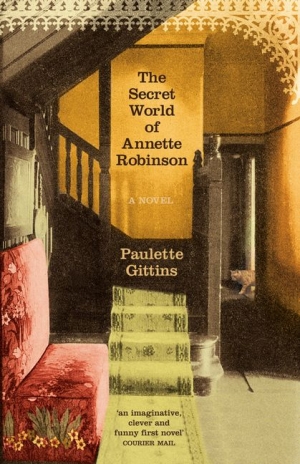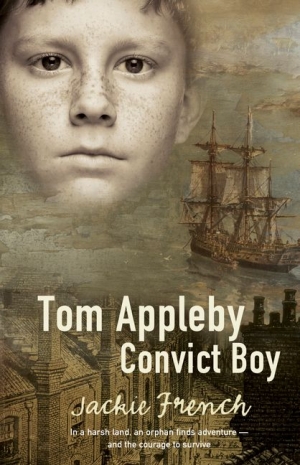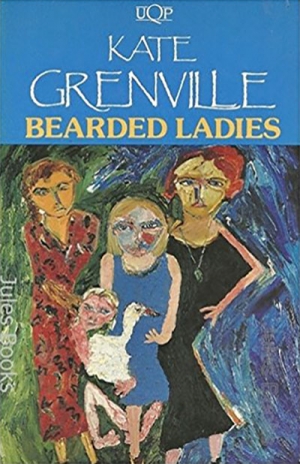University of Queensland Press
Brian Henry reviews ‘The Best Australian Poetry 2004’ edited by Anthony Lawrence and ‘The Best Australian Poems 2004’ edited by Les Murray
Publishers and the publics they serve seem enthralled by the idea of ‘the best’. The best of what is ultimately less important than the superlative itself, which implies a rigorous screening process to isolate the most worthy material. Never mind that magazine and book publishers have already put writing through a brutal screening process with acceptance rates from .01 to 1 per cent. For readers whose schedules or temperaments prohibit them from doing the work themselves, a collection of ‘The Best’ can be useful and appealing.
... (read more)Rodney Hall has always been a professional poet in the sense that he professes and declares – indeed, almost seems to make himself – in his poetry. The poetry seems to become a means of coping with experience; more, it becomes perhaps the central part of the experience. So it is in Black Bagatelles. But here, art and its expectations become less something for living than for dying by. Not that this book marks any great break with what has gone before, any rupture of identity. On the contrary, implicitly or explicitly, death has always been a major presence in his poetry. Its preoccupation with art and artifice represents, amongst other things, an attempt to give himself alms against oblivion. But in these poems the note of doomsday, sounded in the title of his first collection of verse, Penniless Till Doomsday; rings out, not portentously, but wittily, with immediacy and perception. Hall has always been concerned with masks, poses, the dance of experience. Now, the ‘masks compose themselves tableau-still’ and the source is revealed of the ‘desperate rustlings going on behind’. This source then is death, but not death majestical and metaphysical as Donne and the seventeenth century ‘knew him, not moralising and the servant of the mighty God as in the middle ages, but jester and joker, the one who calls the tune to life’s comedy, to
… the hold of
heart
on heart the band
of gristle the bloodtie
just
waiting to be
bled to death by a clever cut
... (read more)Sylvia Martin reviews ‘Wildflowering: The life and places of Kathleen McArthur’ by Margaret Somerville
‘Wildflowering’, a term coined by Judith Wright, describes the activity of searching for wildflowers in the bush. In letters between the poet and her friend, wildflower artist, writer and activist Kathleen McArthur (1915-2001), ‘the language of flowers’ becomes part of the mutual exchange of their friendship and epitomises the interactive and intimate relationship they maintained with landscape. Over the years, these women took the knowledge and love of their places into political campaigns to preserve the fragile ecology of an ancient coastland against the ravages of development and commercial exploitation.
... (read more)Dianne Dempsey reviews 'The Secret World of Annette Robinson' by Paulette Gittins and 'Percussion' by Jay Verney
Jay Verney’s voice is not unlike Gillian Mears’s – rich, confident and brimming with adroit asides. Verney frequently stops to smell the roses, and dig around the compost. She observes the variations of a landscape, the behaviour of her characters, the nature of an institution. Here she is on a McDonald’s restaurant in Palm Springs: ‘It was America in metaphor, though without the crazed gunman to add that final touch of piquant authenticity.’
... (read more)Margaret MacNabb reviews ‘Tom Appleby, Convict Boy’ by Jackie French, ‘Stoker’s Bay’ by Peter Jeans and ‘Ichabod Hart and the Lighthouse Mystery’ by James Roy
In an era when so many young people seem to be cosseted and protected from anything harsh or dangerous, there are still good books to show them the darkness and complexity of real life. These three new titles are all emotionally and intellectually confronting, and none pulls any punches. In James Roy’s Ichabod Hart and the Lighthouse Mystery, convicts are deliberately mutilated to make them more efficient in the mines; in Peter Jean’s Stoker’s Bay, one character is flogged almost to death as a punishment for rape, and another is drowned with his hands bound; and in Jackie French’s Tom Appleby, Convict Boy, an otherwise light-hearted offering, there is a graphic hanging scene.
... (read more)Garry Walter reviews '"Madness" in Australia: Histories, heritage and the asylum' edited by Catharine Coleborne and Dolly MacKinnon
There is burgeoning interest in the history of psychiatric institutions and services in Australia. Catharine Coleborne and Dolly MacKinnon’s ‘Madness’ in Australia now sits alongside Stephen Garton’s Medicine and Madness (1998), Milton Lewis’s Managing Madness (1988) and numerous articles on the subject that have been published in recent years in local journals of medicine and psychiatry. Perhaps this interest represents the desire to record for posterity the role of the asylum and older-style treatments in the care of the mentally ill in the wake of new, cutting-edge national mental health policies and agendas. Possibly, the fascination represents an unconscious, necessarily forlorn attempt to undo, through revisiting, some of the abuses of psychiatric methods in the past. Whatever the reason, one of the problems faced by a slim tome such as this is that mental health services in Australia, since their inception, have been characterised by an extraordinary level of complexity and diversity. To capture their essence in a small, multi-author volume, and to provide a coherent, integrated synopsis, as the editors might have hoped, is probably not achievable. If, however, we are to view ‘Madness’ in Australia with less aspiration – as a collection of essays devoted to different, often novel, aspects of asylums and institutions – then it becomes an absorbing and welcome addition to the literature and furthers our understanding of these grand edifices.
... (read more)Ruth Starke reviews 'Rain May and Captain Daniel' by Catherine Bateson and 'Too Flash' by Melissa Lucashenko
In the list of life’s most stressful events, family breakups and moving home are way up there in the top ten, and one often follows the other, compounding the trauma. This is the situation for eleven-year-old Rain in Catherine Bateson’s Rain May and Captain Daniel, when her mother, Maggie, sells their inner-city house in the aftermath of divorce. They head for the country to turn Grandma’s deceased estate into a dream home. Maggie’s hopes are higher than her daughter’s: she foresees serenity, harmony, and self-sufficiency; Rain expects ‘Boringsville’.
... (read more)Poems are like mangroves. They lodge and grow in the mind, becoming part of us, just as these plants take root in estuarine silt. Even on the page, there is sometimes a resemblance. As its title suggests, Laurie Duggan’s first volume since New and Selected Poems (1996) is substantially a product of his recent move to Brisbane, containing a large section of poems coloured by references to the city’s subtropical conditions. However, Mangroves also brings together varied material that dates from 1988 to 1994, some of which – notably the ‘Blue Hills’ sequences – has been published elsewhere.
... (read more)Peter Steele reviews 'Collected Poems 1943–1995' by Gwen Harwood
W.H. Auden, following Samuel Butler, thought that ‘the true test of imagination is the ability to name a cat’, and plenty of people, poets, and others have believed this: to recast a dictum of Christ’s, if you can’t be trusted with the cats, why should we trust you with the tigers? Gwen Harwood could be trusted with the cats, and with yet more domestic things; here, for example, is her fairly late poem ‘Cups’
... (read more)Carolyn Tétaz reviews 'Bearded Ladies/Dreamhouse' and 'Joan Makes History' by Kate Grenville
Being out of print is like moving back in with your parents – it’s not usually a sign that things are on the up. But fortune’s wheel turns with scant regard for merit or effort, so it must be a relief for writers when their publishers decide to ‘celebrate their continuing contribution to Australian literature’ with a re-release of their back catalogue.
... (read more)
